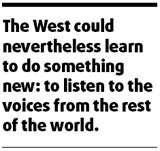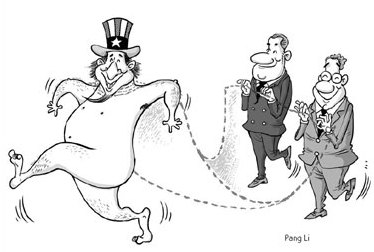An emperor with no moral clothes
By Kishore Mahbubani (China Daily)
Updated: 2008-04-03 07:29
Updated: 2008-04-03 07:29
Something remarkable has happened in the struggle for greater freedom and democracy. The world's most powerful nation and the traditional beacon for democracy, the United States, has slid backward.

And yet Western discourse largely ignores this process, as evidenced by the sweeping speech on democracy delivered by the British Foreign Secretary, David Miliband, last month.
The first flaw of Western discourse is its inability to practise what it preaches in this respect: to speak truth to power. This is revealed in the reluctance of Western governments to discuss the most catastrophic reversal in the field of human rights: the decision by the US government to defend the use of torture.
In the evolution of human rights there have been two quantum leaps: the first was the universal abolition of slavery; the second, the move toward abolishing torture.
Ten years ago, if anyone had suggested the US would reintroduce torture, the answer would have been "impossible". Yet the impossible has happened. Amnesty International has described Guantanamo as "the prison of our times". Despite their history of condemning human rights violations, no Western nation has condemned the US government for Guantanamo.
Sadly, even though he faced no personal risks, Miliband could not muster the courage to speak truth to power regarding Guantanamo.
Even more tellingly, in the US there has been a broader reversal on many civil rights issues. In the face of threats from terrorism, the population has, in effect, accepted a reduction of civil liberties, symbolized by the Patriot Act. In so doing, Americans have revealed that in a crunch they behave no differently to other societies. When they feel threatened, they too are prepared to sacrifice civil liberties.
The second flaw in Western discourse is the refusal to recognize its track record of double standards in the promotion of human rights and democracy. When a Western country has to choose between promoting its values or defending its interests, interests always trump values.

No Western country promotes democracy in their ally in the Middle East where they get oil. Too many interests would have to be sacrificed in doing so. But in other countries where no major Western interests are at risk, values can take primacy.
When Tashkent agreed to host a valuable US military base in the battle against terrorism, the British ambassador, Craig Murray, was forced to resign in protest against the silence of his government on human rights abuses.
We are moving toward a more intelligent world. Globally, the number of highly educated people, especially in Asia, has never been higher. They can now make well-informed judgments about what the West does with human rights. Hence, while the West conducts a self-congratulatory conversation on the subject, the rest of the world sees an emperor with no moral clothing.
The third flaw in Western discourse is that when presented with a choice between doing good and feeling good, the West almost always chooses the latter because it costs less.
History teaches that sanctions and exclusions have never succeeded in transforming societies. Engagement and dialogue over time lead to change. The tragedy of 20 years of isolation of Myanmar has done no good, even though the politicians of the West have felt good condemning its government.
The time therefore has arrived for a new discourse between the West and the rest on freedom and democracy.
In December we will celebrate the 60th anniversary of the Universal Declaration of Human Rights.
This may well provide an opportunity for the West to change course; it could nevertheless learn to do something new: to listen to the voices from the rest of the world.
The Guardian
(China Daily 04/03/2008 page9)
|
|
|
|